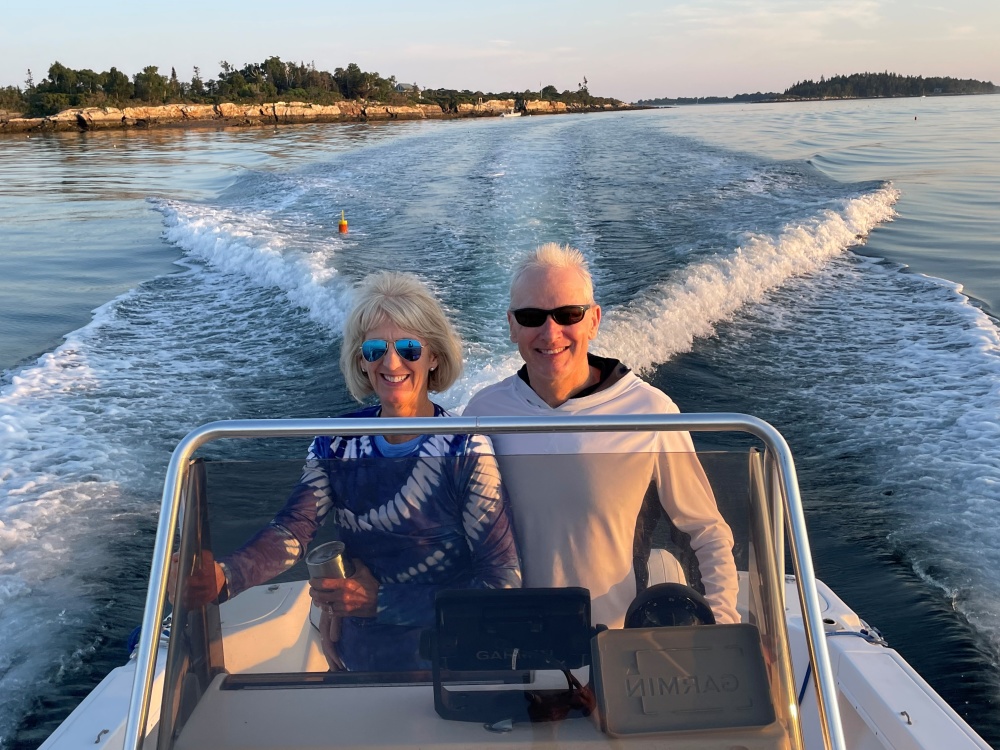In early March of 2018, at age 58, Roger Miller went to a local doctor’s office in Maine for outpatient surgery. He’d been putting off getting what he’d thought was a cyst removed from the back of his head.
During the procedure, he overheard the surgeon say, “Oh, this doesn’t look good.”
Miller, who at the time was working as a maritime consultant, wasn’t all that worried. He and his wife, Lisa, had just returned from backcountry skiing in British Columbia. He felt fine.
The pathology report that came a few days later suggested otherwise. Miller had stage IV melanoma.
He called Lisa to deliver the news. “I almost threw up,” says Lisa, a corporate executive turned career coach. “Then I said, okay, we’re going to fix this.”
“We marched forward, instantly,” says Miller, who had spent his career as a merchant marine prior to becoming a consultant.
A call to a family friend pointed them to Dana-Farber.
“Given my stage four diagnosis, I’d rather be in Boston,” says Miller, who lives just north of Portland, ME. “It’s two hours flat on any given day for us to be on Jimmy Fund Way. No big deal.”

Timely and untimely discoveries
After a series of evaluations in late March, Miller’s oncologist, Elizabeth Buchbinder, MD, delivered round two of unfathomable news: The melanoma had spread to his pelvis, lungs, and brain.
“We see a lot of people who come in with few symptoms and late-stage disease,” says Buchbinder.
Had Miller come in with the same diagnosis just a few years earlier, he’d have had few options. But a combination immunotherapy had recently been approved for metastatic melanoma. Plus, an ongoing trial examining its effects on patients with brain metastases was showing positive early results.
Immunotherapy has deep roots at Dana-Farber. Gordon Freeman, PhD, had done foundational work at Dana-Farber to uncover the existence of brakes on immune cells, called checkpoints, that impair their ability to fight cancer.
“Freeman’s work set the stage for the development of drugs that have revolutionized the treatment of not just melanoma but many forms of cancer,” says Buchbinder.
In metastatic melanoma, for instance, approximately 50% of patients taking a combination of two immune checkpoint inhibitors, ipilimumab and nivolumab, sometimes called “ippy-nivo,” were still alive 5 years later. Historically, 5-year survival for this group of patients has been much lower.
The therapy hits the immune system in two different ways. Ipilimumab encourages T cells to be more vigilant in their search for abnormal cells such as cancer cells. Nivolumab unmasks the cancer so that those revved up immune cells have an easier time finding it.
By May 11, Miller had completed two of four planned infusions of the medicines.
Wanted and unwanted birthday gifts
Miller’s third infusion was scheduled to occur on Lisa’s birthday in mid-May. They arrived at Dana-Farber daring to wish for a birthday gift of good news. They got it.
“After six weeks, the scans showed that the cancer in the brain and everywhere else was shrinking,” Lisa recalls, reading from a journal that she’d kept throughout their journey.
But the lab results showed that Miller’s liver was inflamed. It was the first sign of the downside of this combination therapy.
“The immune system can get too revved up and start attacking normal tissues,” says Buchbinder. “The side effects can be severe and unpredictable, though we are getting better at managing them.”
The numbers were bad enough that they had to pause therapy.
Pausing therapy can be nerve-wracking for people with cancer, but Miller has nerves of steel. “They call you the patient because you have to be patient,” he says.

It helped that Buchbinder explained the science behind this type of immunotherapy. “She said it can still work even after you stop taking it because it has triggered the immune response and that keeps going,” recalls Lisa.
For Miller, it did keep going against the cancer, but it also attacked his digestive system. By the end of June, he had been admitted to Brigham and Women’s Hospital. Unable to eat, Miller stayed in the hospital for nearly three weeks.
He had turned 59 while admitted and had lost 33 pounds. When he left, says Lisa, “he looked like an 80-year-old.”
But he was alive, and his cancer was still, amazingly, vanishing.
Good fortune and promising future
By January of 2019, Miller was a few months into a 24-month course of nivolumab alone. This single agent therapy has fewer side effects but helps to continue to unmask remaining cancer cells so that Miller’s revved up immune system can find them.

He’d put weight back on and regained strength, so he and Lisa asked Buchbinder if it was okay for them to travel. They wanted to ski in Austria, a place they loved. Buchbinder, also a skier, got it. “She said yes,” says Miller, “It was more than the science, though. She knew it would be good for our souls.”
Today, Miller is cancer-free. He’s not taking any medication and he goes in for scans twice a year. “There’s no evidence of the cancer. There are no side effects. There’s no anything,” he says. “It worked.”
The treatment doesn’t work for everyone. In fact, fewer than one in five people experience a complete response like Miller did. And only 50% have a durable response, meaning they still have cancer, but it isn’t getting worse.
Today, however, there are hundreds of novel immunotherapies under investigation. Some are showing signs that they might make a difference for patients with melanoma who don’t respond to existing therapies.
“It’s such an exciting time,” says Buchbinder. “These new therapies are hitting the immune system in many ways and on different levels. There’s just so much going on that could make a difference for melanoma patients who need it.”

What a fabulous success story, the goal is for all patients to have this be their story!
Truly remarkable. You’re now text book! Patience, perseverance and medicine for sure. But they left out the infusion of love which clearly put you over the top. Wonderful news and a fantastic read on this rainy Monday afternoon. Congrats and cheers to you both❤️
Roger and Lisa are an extraordinary couple who inspired me and many in our community during this challenging time. So grateful to the team at Dana Farber who took such great care of him!
I remember the day that you brought this news to the office. I am so grateful, so grateful, for this resounding success and the news that there can be success with a disease that confounds and devastates so many. Roger, Lisa – I am so happy for you both. Live long and prosper. And thank you Dana-Farber for all that you’ve done and continue to do.
Thank you Dana Farber for all the good that you do!
Ken